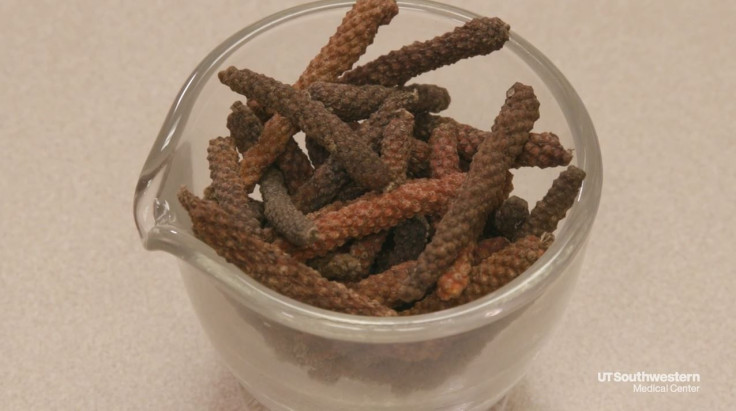Ayurveda: Spicy Indian Pepper, From Ancient Medicine, May Hold Key For New Cancer-Fighting Drug

Scientists have their sights set on a new potential cancer treatment, and it’s something you would use to spice up your food: a pepper.
The Indian long pepper contains a chemical that could stop your body from producing an enzyme that is commonly found in tumors in large numbers, according to a study in the Journal of Biological Chemistry. It says the chemical, Piperlongumine, “inhibits proliferation in cancer cells but not normal cells.”
Read: Docs Kill Cancer with Lasers and Ocean Bacteria
That substance has long been believed to have medicinal properties, including against various cancers like those in the breast, prostate, lung, colon and brain. Now researchers have discovered how exactly it combats those diseases. The UT Southwestern Medical Center said in a statement that its scientists showed the chemical, once ingested, becomes “an active drug” that suppresses the gene creating the unruly enzyme.
“It can shrink tumors, it can kill cancer cells,” study author Dr. Kenneth Westover said in a video from the Dallas medical center. “But it's just not as potent as we would like.”
Westover, a professor of biochemistry and radiation oncology, added in the statement from the medical center that he hopes the finding will give a boost to drug development efforts, “to improve the potency of [Piperlongumine] for use in a wide range of cancer therapies.”
The investigation into how the long pepper works is not the first time scientists have looked to a spicy pepper for a possible cancer treatment. A recent study out of Germany found that chili peppers may stop breast cancer because the compound that gives them their kick, capsaicin, inhibits tumor growth in that disease’s most aggressive forms. The capsaicin acts on a temperature-sensitive receptor in the tumor cells and makes the cells divide — and thus multiply — more slowly. And because the cells studied were not moving as quickly, those researchers suggested, they were unable to form metastases, secondary cancerous growths that spread from the original tumor site.
In the case of the long pepper, which is found in southern India and southeast Asia and used as a seasoning, the plant has long been suspected of having medical benefits. “It dates back thousands of years in the Indian subcontinent tied to Ayurveda, one of the world's oldest medical systems, and was referred to by Hippocrates, the ancient Greek physician known as the father of medicine,” the UT Southwestern Medical Center said. Doctors are now turning to the pepper again with the finding that it inhibits a gene that creates a “detoxification enzyme that is often overly abundant in tumors.”
“We learned something fundamentally new about a 3,000-year-old medical claim using modern science.” Westover said.
Source: Westover KD, Harshbarger W, Gondi S, et al. Structural and Biochemical Analyses Reveal the Mechanism of Glutathione S-Transferase Pi 1 Inhibition by the Anti-cancer Compound Piperlongumine. The Journal of Biological Chemistry. 2016.
See also:
Dirt Could Hold New Cancer Medicines



























